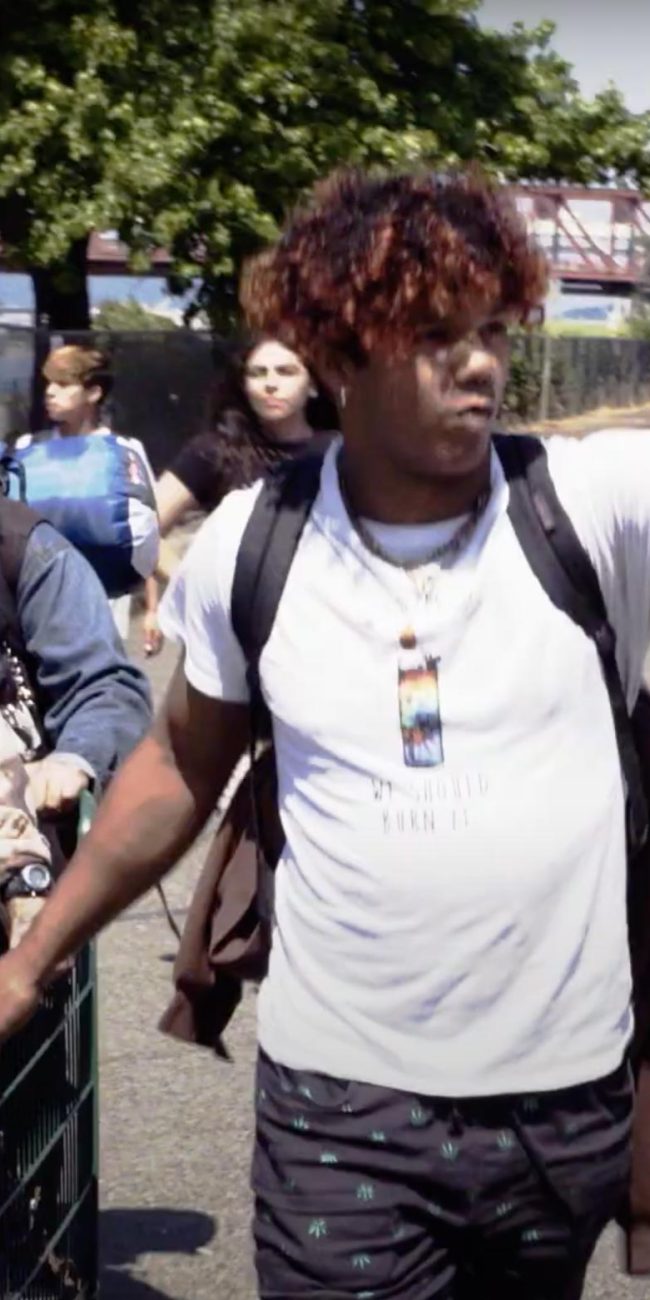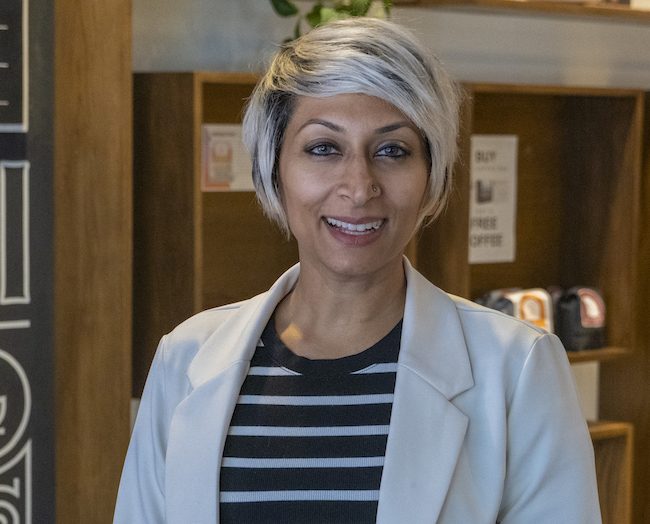A Conversation with Alex Noyer & James Jagger (THE SOUND OF VIOLENCE)
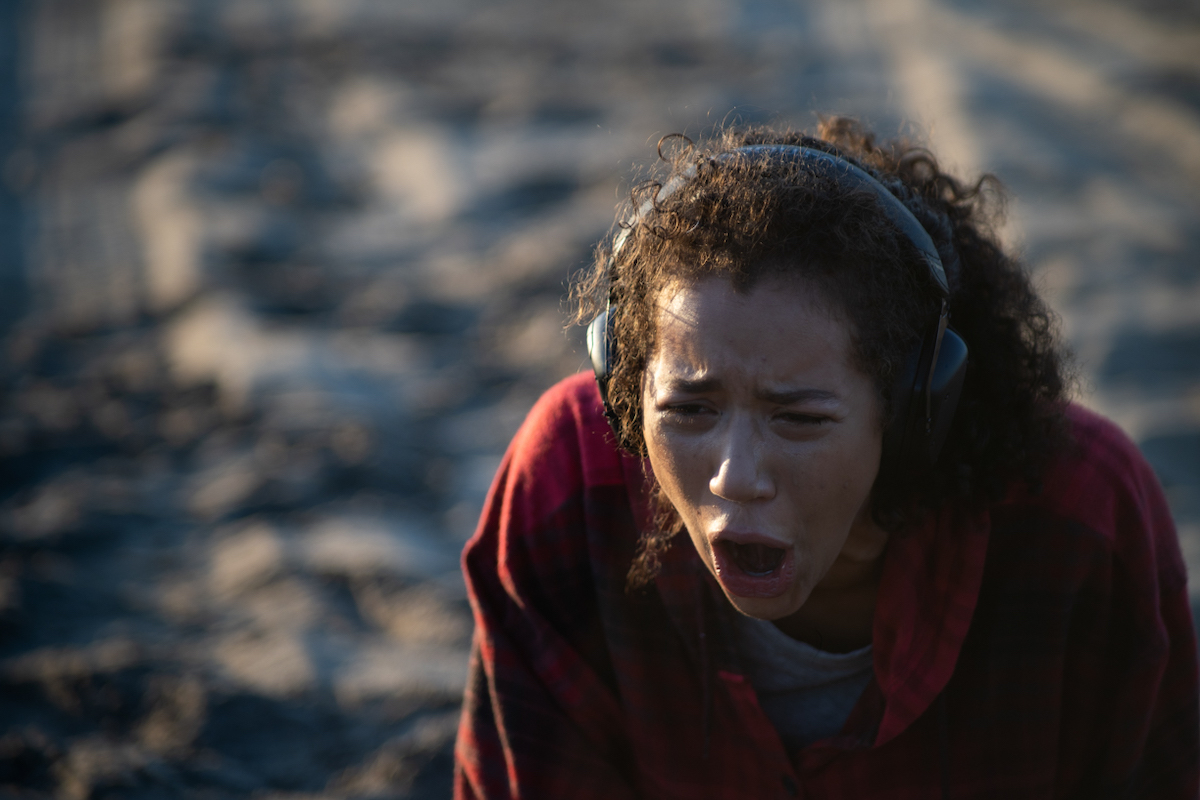
One of the best things about being a filmmaker who has a film on the genre circuit is you end up hanging out with the same filmmakers again and again at different festivals over the course of a year. You start to get really invested in their career as well as yours because you want to see them at the next festival. When Sound Of Violence premiered at South by Southwest and I was reviewing it, I was about halfway through the movie when I realized ‘oh I saw the short of this’ like 10 times at 10 different festivals because it was often in the same block as my own film. I had met director Alex Noyer in San Diego at Horrible Imaginings which is one of the most demonically constructed film festivals I get to go to. The artistic director has such an eye for really surprising the audience whether it’s with Gore or just pure shock with whiplash twists in every program. The short version of the Sound Of Violence, The Conductor, was one of the bloodiest things I had ever seen. And it seemed really an unlikely possibility to be made into a feature. Fast forward to three years later and I’m talking with Alex over zoom and his film is premiering at South by Southwest. Now available on VOD, the Sound Of Violence really proves how much you can make out of a short when given the opportunity to expand the world. Here is my interview with Alex and James Jagger, who plays Duke in the film. James is also the son of a very famous British rock star.
Hammer to Nail: James, great work in the film. I did want to see you die, but I tend to side with women in films in general. Even when they are terrible people.
James Jagger: I don’t ever really want to see my character die that much. I mean, I didn’t in this film cause he was a nice enough guy. I think there’s some films where you’re just like, “you can go, I don’t really mind, I won’t lose sleep over it.”
HtN: As someone queer I just always cheer for two women getting together and being fortunate to remove the men out of the way, because that makes the world a better place.
Alex Noyer: We feel that we were authentic on that point. I mean, obviously with Jasmin (Savoy Brown who plays Alexis Reeves, our ‘killer’) that’s one of the main things. She obviously imagines she is in a same-sex relationship and she has the all those things so we want it to be really, I would not have gone any other way with the casting because…
HtN: Yeah I thought you did pretty well. I mean, I did wonder if it was one of those ‘lesbians are hot’ kind of trope. So, yeah, I mentioned that the review, but it didn’t kill the movie for me at all.
AN: Thank you.
HtN: Yeah. Yeah. that felt true. So let me ask you, the short is very different from the feature in that, you’ve got these additions, like the synesthesia I thought was, a really nice kind of major plot line. And then the focus on Jasmin’s character, as opposed to in the short, the focus is more on someone learning to play an instrument and not realize that was going on.
AN: Yeah. We bring in Alexis into that. We start on that Cube that says her name. So we know she’s, we’re following her journey. Despite all its surprise and all the great response we had to the effects and everything that we put into this short fundamentally, it was all about the character. And the character of Alexis really drew a lot of attention and questions. Although I was not intending to turn it into a feature, the response I got kind of confirmed my instinct that the character deserved an expansion on her universe. And that’s where the movie really came about. And first her backstory and then her journey going forward and synesthesia was, first of all, it’s a fascinating ability. And I call it an ability cause I know sometimes it’s referred to as a condition, but I find it more of an ability to experience sound in a new dimension, is something that is fascinating.
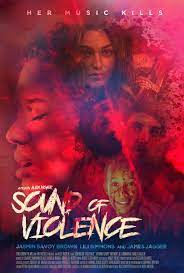
And it inspired, I discovered artists painters and musicians who have disability and as an ability goes, it allows them to experience something different than whether it is like a…there’s a painter called Melissa McCracken and she paints what she sees. And then there are many music producers who have synesthesia and we talk about how it affects their producing process. So I felt that it was a great way to give the audience a sense of, sort of a visual representation of the creative high and the manifestation of inspiration. And that would help with the motive, especially cause shifting the paradigm so that we follow.
HtN: That is one of the things that I really felt in the film is that it’s one of the first times when I saw a slasher flick and actually really didn’t blame the slasher for doing the things that she did because I understood where she was coming from and the need. I mean, it’s one thing to follow, like an urge. That’s almost like an addiction to get that orgasmic feel that she’s getting. But it’s another thing when you’re completely worrying that you’re going to lose your hearing entirely, and this is the only way to get it back. So, I thought that was really effective. And I also really appreciate that you said that when you made the short, you weren’t intending to make a feature. So many times you see a short and it feels like a test piece for the feature. And I think that’s one of the reasons why this feature is so different than the short that you were able to like step further away than I think, than most people and really build it out with more characters and increase the world and the torture.
AN: If I did 90 minutes of what I did in the short, it would not have worked. It would just be 90 minutes of blood. And I do love practical advice and I do love horror in that way, but I felt really compelled to make a character piece here because I wanted the audience to have a conflict in relationship with Alexis. And that would not…if I just made it over the top, throughout, there would be no connection between Alexis and the audience. And that would be a shame, that would be a waste, really. I had a script that was over a hundred pages of nice, I chopped off 24 pages of gore.
HtN: That’s impressive!
AN: To then rebuild the character journey, to rebuild that. And then taking it to the thriller route. So I would reinsert some of the violence, but it would be built now interwoven with drama. And it was a challenge, but I really enjoyed it. And I hope the audiences will as well.
HtN: James, I’m interested in your involvement in a film in which music is evil, considering your family history. That’s kind of an interesting connection.
JJ: I think it is very interesting, but I don’t know if I agree that music is the evil thing. I think, it’s more that it’s like a need, it’s an urge. It’s like, it’s not that it is in itself, got an essence of evil, but it’s more of, I don’t know, it’s an urge, she needs it. She needs to sate this feeling. And the feeling isn’t the violence, it’s the making the music, it’s getting these sounds, it’s the creativity. And I think that I’ve always thought it’s interesting the way that the different artists go about their routes towards finding, kind of creative inspiration. And I think, I used to always read about like Brian Eno and David Bowie in the 80s were doing all these strange stuff with oblique strategies. And my wife’s an artist and she was a fan of Salvador Dali and the way he used to sleep deprive himself to try and get them to a point very close to sort of like…
HtN: Insanity.
JJ: Yeah. Insanity, basically. So, I think that the way all these different people kind of go about their processes is such an interesting thing. And I think the Alexis character’s process is what kind of attracted me to the script in the first place, because reading through these first scenes that happens in downtown, I’m really curious about like, “Whoa, what drove this person here? And what do they get out of it?” And I was so curious to how Alex would show the synesthesia written large on screen. And I think they did a great job of making that a really important aspect that woven itself into the scene without being kind of domineering in some huge, big effects thing. I think it does a really good job of walking that fine line.
HtN: Interesting festival connection. There’s a Charlie XCX documentary at SXSW this year and she has synesthesia. What kind of research did you do on synesthesia in order to write this? Did you talk to anybody who has it?
AN: Yeah, I mean, I did. And I also just read everything I could find. And the more I read, the more I realized as well that the way synesthesia is so different from one person to the next. I read the sort of formal scientific side of it. And then I read, as mentioned, I discovered everything from painters to producers who described their experience of it, then how it’s intertwined with their own process. And what I loved about it is that it’s, again, being very individual. I was not either disrespecting or taking a risk by creating her own type of synesthesia that specifically reacts to the noise of the flesh. And also as far as the manifestation, again, because there’s no way to record synesthesia.
So there’s no way to describe it. I want to see it, sorry. I read the descriptions and I saw paintings and I saw people trying to render around what they saw and I realized that from there, I could create something. And then when we were actually doing a recording session, the person supervising the recording had synesthesia. So she, again, ad hoc validated what we had done. And that was good because with everything that, again, in this movie that is not mine, that is not something I can relate to directly. I just kind of kept it always as an open question to make sure that I could, for example, with hearing loss, we had a consultant on set, we made sure that the experience of young Alexis was accurate because as a child who has lost her hearing in an accident and regains it in a traumatic event, we need to get it right.
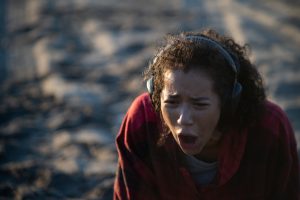
Jasmin Savoy Brown in THE SOUND OF VIOLENCE
We needed to know the proficiency in sign language and the proficiency in speaking. And they were really telling us, no, if she spoke, cause she’s 10 years old by the time. And she had only our accident a couple of years earlier. So she would still speak completely normally, and sign would be hesitant and similarly, her mom would only try to, so the late breeding and such. So we had those scenes where they were both speaking and signing. And again, we had our consultant who, for example, told us, you cannot use the word deaf. Like, and that was an important one because we didn’t know that. That in the deaf community, it is important to make deaf, which is a condition that you’re generally born with, versus loss of hearing, which like, for example, in an accident and such.
So, I’m the son of an artist. I lived around the artists my whole life. Similarly, I was also surrounded by very inspiring and powerful women my whole life. So those two parts I could tap into for many part of the story to get the artist’s journey right, and then also led me to think of the characteristics as a woman, rather than a man. But as far as anything that I didn’t grasp personally, I reached out to people who are willing to share their experience and their stories to get it right. And similarly as well, and the fantastic opportunity I had to cast Jasmin as the lead. I have two daughters and so for their sake, I needed to get it right. And also because this movie is about empowerment. The empowerment to follow your truth, to follow your inspiration. Yes. I’m carrying it into a gruesome…
HtN: Hey, I believe that women and queer people can be serial killers too. That’s our right.
AN: Absolutely. But the main point is that the empowerment of following your truth, and following your inspiration, and following that journey is something that when my daughter’s old enough to watch this movie, I want them to get that out of it. You know, it’s not, and for that census, the team needs to start with every person playing a role in this movie.
HtN: From a casting perspective, I was happy when I read on Wikipedia that Jasmin identifies as queer.
AN: Yeah. An activist on the topic. It was very important because again, it’s about authenticity. And I think, we know that our industry is finally learning its lesson of being accurate in casting. And there are things that you could possibly…but for example, I read a review saying, “Oh, how could you not cast a deaf girl to play?” And obviously I can’t respond to that, but all I can say is that, “Here, I can tell you, she’s not a deaf girl. That’s the point she lost her hearing and regained it.” So…
HtN: It might actually be offensive to cast a deaf girl.
AN: And use the word deaf on the wrong context. And again, this is why asking question and keep an open mind, even when writing the story, it’s the only way I can humbly deliver a story like this, with who I am and what the story is.
HtN: Yeah. James, what about the character got you excited, especially when you knew you were going to be playing against like two very strong women where they were going to have the final showdown. You were like, I want to be shoved in the middle of that triangle?
JJ: It’s interesting. But I think as an actor, you’re not just necessarily to be like, “I want to be that character.” It’s more the overarching kind of attraction of a project. And I think that it was a subtle character. You don’t want to be this total antagonist, even though you are the antagonist of the film, you don’t want to come across too strong in that way. And I like that it gave us a lot of space and really let us explore and kind of stand up the characters as much as we could. And the three of us would sit around talking about how we could improve on this scene, how we could get a little more out of this or how we could figure out something that just might be otherwise overlooked. So it was a really fun project. I think it was a combination of lots of things that attracted me to the script. Certainly Jasmin, I was honestly a fan of hers.
HtN: Had you seen the short beforehand?
JJ: Oh yeah, absolutely I was like, “Oh, that’s a lot.” I actually said that to my friend, who’s a big, big horror fan. And I said, “Yeah, I think I’m going to do this horror film, but I’m just like worried. It’s like, I might get a little bit like in my head.” People think of horror writers as these like devious people in a bat cave, like drinking pints of blood, and really just like lovable, fun, loving anyone. And it’s the same kind of when you come to actually like play something like this. It’s just a family where a gypsy traveling family trying to make a movie and it was just such a fun experience and everyone was pulling so strongly. And when you only have 20 days, you really like we’re in this, we’ve got to really like, really do long days. And we’ve got to do this to the absolute best of our ability. And it was just a great experience. And I’ve never, ever encountered so much care and detail put into blood. But it were like obsessive every day.
HtN: I remember being in the audience when I watched it in a theater with a large group of people, the short. And I just remember going, “Oh my God, I can’t believe it went there.” It was one of the most violent, destructive, bloody things I’ve ever seen, which I think elicited a lot of applause afterwards because that was the kind of festival it was. Okay. Last question, Alex, I want to ask you about the music and what your thinking was behind in creating this sort of weird, sonic torture, ambiance, I don’t know, cool experimental shit that she’s putting together.
AN: Well, I mean, this is where the short is so beneficial as an experiment because, I mean in my career I interacted with music a lot and even back in my days I was a DJ, a terrible one, but I was good at picking music, but just terrible deejaying it. And I felt that if I’m going to come up with a music driven thriller, I had to test the waters. I said, well, so I’m going to make music with flesh. And we need to use an instrument to do that. And we need to align all that. And they look at me and say, “you’re crazy” and say, “I’ll take that, but can we do it?” And obviously with a drum machine, there’s an inherent logic because beats are violent. I mean, the notion of beats is violent. So, controlling impact was obviously sort of logical, but then to carry it forward in a movie and experimenting with other instruments, I had to jump down crazy ideas. Many of them didn’t make the film, but I also wanted to explore instruments that were not common for people to see, but at the same time were also relevant to the world of horror. And a theremin is a great example. And I had so much fun discovering and studying instruments that I, as a non-musician, but it’s coverage so much and trying to put them into, “Okay, how do I use them to be the capitalist of something dark and gruesome?”
And then to round it up, Jasmin being a musician is also, because she is a singer songwriter, allowed a natural comfort for her to put ourself in a situation. And her rhythmic sense to the instruments might be completely foreign, but she took the time actually to practice playing the theremin, for example. And that allowed us to really get in to those scenes and let her groove. And we had saw our amazing DP Daphne who is a great specialist when it comes to managing lights and color. And that’s why I was so delighted to bring her on board.
And so when we were filming, and so she brought those tubes that are of color, the changing color that you could program. And so when Jasmin is playing the instrument and she is completely in her groove and you can tell. I was on the other side with the tubes and color kind of dancing in front of her, kind of projecting the lights and Daphne in all her wisdom was capturing this whole thing. The performance was a guide, so we were composing music beforehand to give us a guide. Then we led the performance and full with the amazing impetus and energy of Jasmin. And then it allowed us to reach our engineer music to fit both our guide track and the creative discovery that came through performance, to then deliver that final music. So it took a village. As they always say, you have no budget limits on imagination. Well, luckily for me, I could be as wild and imaginative, not because of our budget, which was extremely limited, but because of the amazing people who took it upon themselves to experiment with my crazy ideas to make them happen on screen.
HtN: Yeah. It takes a village, but that village is on the edge of a cemetery, like in Romania in the 16th century.
– Bears Rebecca Fonté (@BearsFonte)








